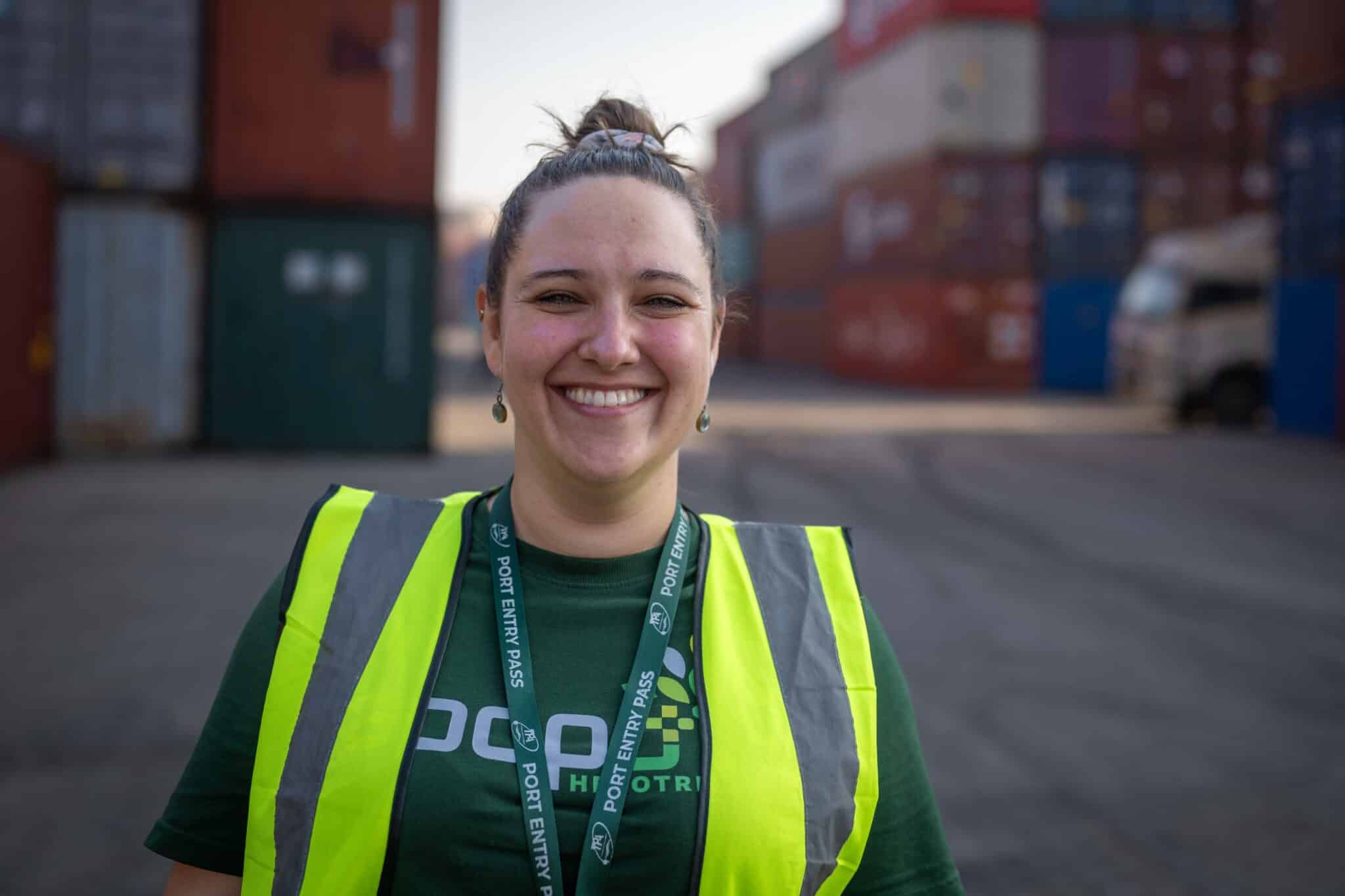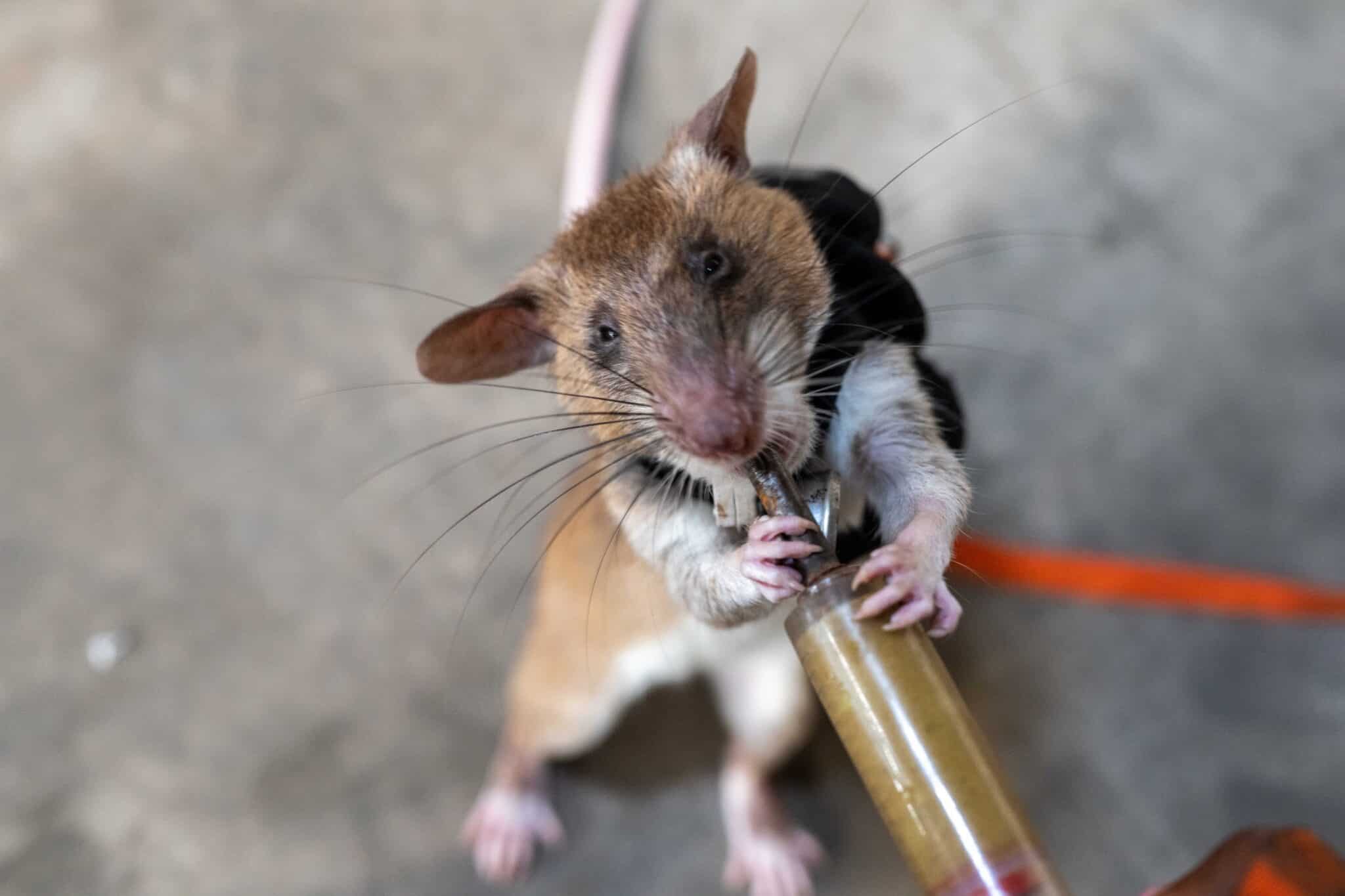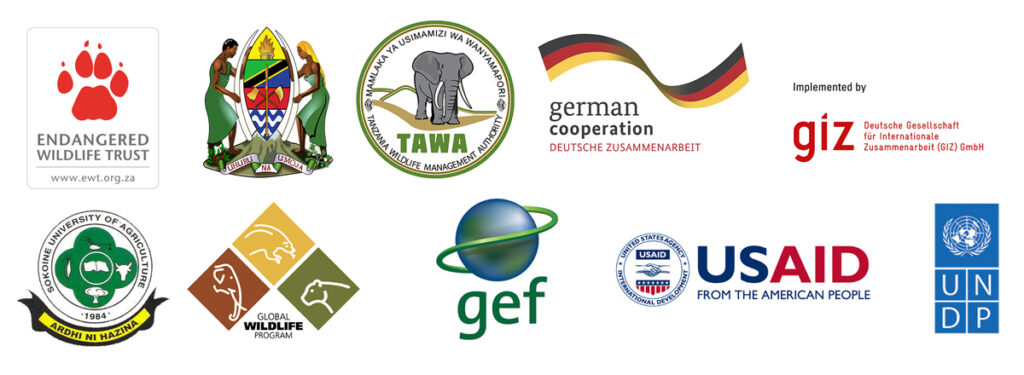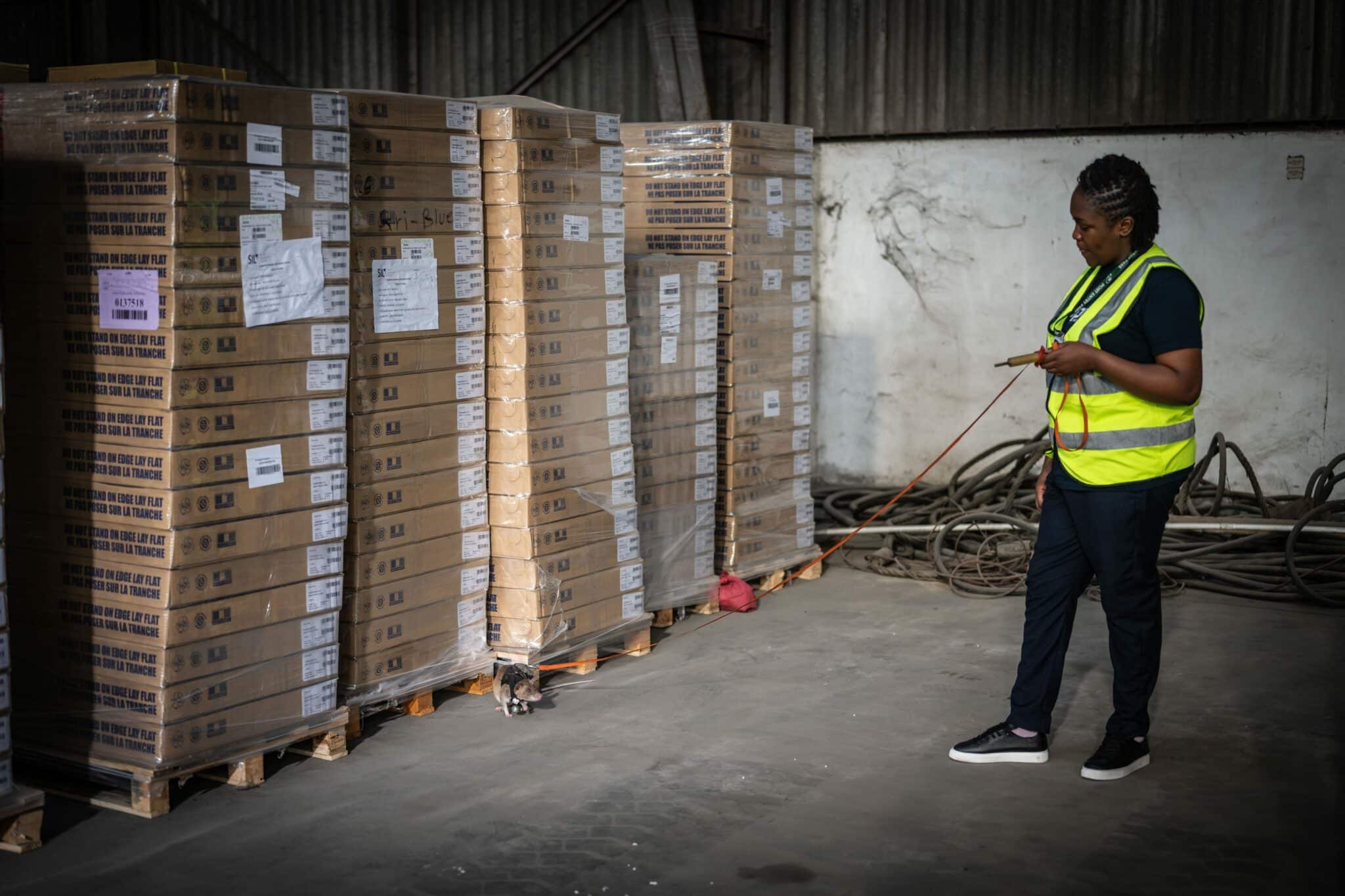Illegal wildlife trafficking remains one of the most critical threats to global biodiversity, putting already endangered species at risk of extinction. A recent proof-of-concept study led by researchers at APOPO has confirmed that our specially trained African giant pouched rats, known as HeroRATs can detect trafficked wildlife products such as pangolin scales, offering a new tool in the fight against wildlife trafficking. The study, which involved APOPO researchers Dr. Isabelle Szott and Dr. Kate Webb, demonstrates the effectiveness of these rats in identifying illegal wildlife products, even months after their initial training.
HeroRATs: Expanding Their Role to Wildlife Detection
For years, APOPO’s HeroRATs have been recognized for their contributions to detecting landmines and tuberculosis. Now, their abilities are being applied to wildlife conservation. This new research shows that HeroRATs, can be trained to sniff out trafficked wildlife products hidden in cargo containers or masked by other strong scents, such as coffee beans or detergent.

“Our study shows that we can train African giant pouched rats to detect illegally trafficked wildlife, even when it has been concealed among other substances,” explained Dr. Isabelle Szott, who co-led the study during her time with APOPO. “The rats’ ability to distinguish between target wildlife products and non-target scents makes them an effective detection tool, especially in complex trafficking scenarios.”
The study, published in Frontiers in Conservation Science on 30 October 2024, also highlights the remarkable scent retention capabilities of these HeroRATs. After undergoing initial training to identify specific wildlife products, the rats were able to retain the memory of these scents for up to eight months, successfully recalling them when reintroduced to the same targets during tests.
Dr. Kate Webb, the first co-author of the study at APOPO and now assistant professor at Duke University, said, “The rats continued to detect wildlife targets after not encountering that species for a long period. This level of retention is comparable to that of detection dogs, which is particularly promising for long-term deployments.”
How HeroRATs Detect Trafficked Wildlife Products
Training the HeroRATs to detect trafficked wildlife products follows a structured and methodical process. The rats are introduced to the specific scents of illegal wildlife items through controlled exposure. They are trained to associate the scent with a reward, typically a flavored food pellet, to reinforce their ability to correctly identify the target.
This initial “indication training” is followed by more complex challenges. The rats are exposed to a variety of non-target scents, such as coffee or washing powder, which traffickers often use to disguise wildlife products. In this phase, the rats learn to discriminate between the wildlife product and other odors, improving their accuracy in real-world scenarios where trafficked wildlife is often concealed.
“The discrimination stage was crucial for training the HeroRATs to focus on the wildlife targets and ignore other distractions that could interfere with their detection,” noted Dr. Szott. “It mirrors what these rats will encounter in real-world trafficking environments, where traffickers are likely to use multiple methods to conceal illegal wildlife products.”
Proof of Concept and Real-World Potential

The study’s success in a controlled environment provides solid proof of concept, but deploying the HeroRATs in the field presents new opportunities—and challenges. The researchers believe that these specialized wildlife detection rats could be used at ports, airports, and border checkpoints to inspect cargo for hidden wildlife products. Their small size allows them to access tight spaces in shipping containers, and their cost-effective training makes them an attractive option for regions with limited resources.
Dr. Webb emphasized the potential impact of these rats on global conservation efforts: “Existing screening tools are expensive and time-intensive. APOPO’s HeroRATs are a low-cost, scalable solution that can significantly enhance the capacity of customs officials to intercept trafficked wildlife products.” With their agility and scent sensitivity, the HeroRATs could screen large amounts of cargo quickly and efficiently, increasing pressure on wildlife traffickers.
However, deploying the HeroRATs in real-world environments will require further research and development. One of the next steps is to design a system that allows the rats to signal their handlers when they detect a target scent. More recently, the research team has equipped the HeroRATs with vests that allow them to pull a small ball when they identify a wildlife product, triggering a beeping sound to alert their handlers. This is intended to streamline the detection process and make it easier to deploy the rats in busy locations like ports and airports.
Ongoing Challenges: Field Deployment and Funding
Despite the promising results of the study, APOPO faces significant funding challenges in scaling up the HeroRAT program for wildlife detection. Securing adequate funding is essential to expanding the training program and deploying the rats in regions heavily impacted by wildlife trafficking, such as parts of Africa and Asia. The need for sustained financial support is particularly urgent as the demand for new and effective wildlife detection methods grows.
“Our study has confirmed the potential of HeroRATs to detect trafficked wildlife products, but further development and real-world trials are needed before they can be widely deployed,” said Dr. Webb. “This requires funding for training, equipment, and logistics, as well as ongoing research to adapt the rats for use in diverse environments.”
APOPO’s ability to continue this important work depends on the support of donors, conservation organizations, and government agencies. As the study has shown, HeroRATs offer a cost-effective and flexible alternative to more expensive and resource-intensive detection methods, making them a critical tool in the global effort to stop wildlife trafficking.
Looking Ahead: Expanding the Use of HeroRATs in Wildlife Detection

The results of the proof-of-concept study open the door to exciting possibilities for using HeroRATs in wildlife conservation. In addition to detecting pangolin scales, rhino horn, and elephant ivory, the researchers are exploring whether the rats could be trained to identify other trafficked species or products, such as African hardwoods or rare plant species.
HeroRATs’ success in scent detection is not only limited to wildlife products. As they have shown in other applications—such as landmine detection and diagnosing tuberculosis—their keen sense of smell can be adapted to different scenarios, making them a versatile asset in conservation, public health, and even law enforcement.
However, the path to field deployment remains challenging. The rats must be further trained to operate in diverse and often unpredictable environments, and the logistics of integrating them into existing customs and border security operations need to be worked out. Despite these obstacles, the study’s findings represent a critical step forward in developing new, innovative methods for wildlife conservation.
New Hope in the Fight Against Wildlife Trafficking
The Wildlife Detection Rats have proven their value in a range of humanitarian challenges, and this latest proof-of-concept study shows that they have the potential to be a game-changer in the fight against illegal wildlife trafficking. Led by Dr. Isabelle Szott and Dr. Kate Webb, this research has demonstrated that they can detect trafficked wildlife products like pangolin scales, even months after their initial training.
With sustained funding and further development, APOPO’s wildlife detection HeroRATs could soon be deployed in high-risk areas, offering a cost-effective, scalable solution to one of the world’s most pressing conservation issues. As the fight against wildlife trafficking continues, HeroRATs may soon play a critical role in protecting endangered species from extinction.
APOPO is grateful to all donors and partners who are instrumental to the success of our wildlife detection rats project.

Frequently Asked Questions
How do HeroRATs help combat illegal wildlife trafficking?
HeroRATs, specially trained African giant pouched rats, are able to detect the scent of trafficked wildlife products like pangolin scales, elephant ivory, and rhino horn. By using their keen sense of smell, they can identify these items even when they are concealed in cargo or hidden among strong-smelling substances designed to mask their scent. This helps authorities intercept illegal wildlife products before they reach their destination.
How are HeroRATs trained to detect wildlife products?
HeroRATs undergo a structured training process where they are introduced to the scent of wildlife products, such as pangolin scales. They learn to associate the scent with a reward, like a food treat. The rats are also exposed to non-target scents like coffee or washing powder to help them ignore distractions and focus on detecting the specific wildlife products. This training ensures they can identify illegal wildlife items even in complex real-world environments.
What was the outcome of the proof-of-concept study led by Dr. Isabelle Szott and Dr. Kate Webb?
The study confirmed that HeroRATs can be trained to detect illegal wildlife products and retain this ability over time. The rats were able to detect wildlife scents even after a five- to eight-month gap, demonstrating long-term scent memory. This proof-of-concept study highlights the potential of HeroRATs as an effective tool in combating wildlife trafficking.
Why are HeroRATs more cost-effective than other detection methods?
HeroRATs are smaller and cheaper to train and maintain compared to traditional detection animals like dogs. They can access tight spaces, such as inside shipping containers, where other animals or equipment may not fit. This makes them particularly useful for large-scale cargo screening at ports and airports, where traffickers often smuggle illegal wildlife products.
What challenges does APOPO face in expanding the Wildlife Detection Rats program?
While the study has shown promising results, funding remains a significant challenge. Expanding the HeroRATs program for wildlife detection will require sustained financial support to train more rats, develop new detection technologies, and deploy the rats in high-risk areas. Additionally, further research is needed to refine the rats’ training and ensure they perform effectively in real-world trafficking environments.
Can HeroRATs detect other illegal products besides wildlife?
Currently, HeroRATs are trained to detect wildlife products like pangolin scales, rhino horn, elephant ivory, and African blackwood. However, APOPO is exploring the possibility of training the rats to detect other trafficked items, such as illegally harvested timber, and could potentially expand their role to assist in detecting drugs or other contraband in the future.

